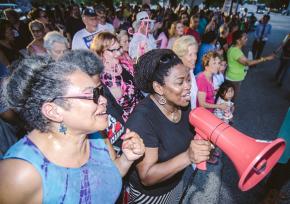Fighting the right in N.C.
and report on North Carolina's all-out assault on workers, and the potential for opposition as demonstrated by Moral Mondays.
OUTRAGE AT North Carolina legislators' determination to push through a Republican wish list of toxic legislation fueled 13 weeks of massive weekly protests--called Moral Mondays--inside and outside the Capitol Building in Raleigh.
Initiated by the North Carolina NAACP, these demonstrations became a rallying point for working-class North Carolinians who stand in opposition to the myriad abuses heaped upon them by the state legislature's 2013 session. Since April 29, more than 920 people have been arrested in acts of civil disobedience .
The final Moral Monday protest turned out the largest number so far--some 10,000 people--on July 29, just days before state legislators ended their session. Protesters promised that this fight wasn't over and said that they were planning more protests throughout the state in the coming months
Inside the Capitol Republicans celebrated ramming through their barbaric conservative platform. In just six months, Republicans drove through a far-reaching agenda, which included implementing new discriminatory voter ID laws, restricting women's access to abortion services, rejecting billions in federal money for "Obamacare," allowing fracking, cutting 170,000 North Carolinians from unemployment benefits, cutting the Earned Income Tax Credit and cutting taxes on the wealthy.

Legislators repealed the Racial Justice Act, which barred imposing the death penalty based on race in 2009 after widespread revelations of fraud on the part State Bureau of Investigations, including the widespread selection of all-white juries for Black homicide defendants and at least one instance of a prosecutor wearing a noose-shaped lapel pin during a trial for homicide.
Last week, Republican Gov. Pat McCrory signed a bill about motorcycle safety, which included language that several restricts women's access to abortion in the state by requiring that clinics that perform abortion to meet standards similar to surgical centers. Out of 16 existing providers, only one will be able to remain open after the new restriction--the same clinic that Christian Identity terrorist Eric Rudolph bombed in 1999.
CUTS TO education this session included axing more than 3,850 teacher assistant jobs, eliminating basic tenure protections and implementing performance-based pay for public school teachers. All restrictions on public school class sizes were also eliminated.
The North Carolina Association of Educators (NCAE), a nonunion advocacy organization for teachers in this "right-to-work" state, has condemned the attacks on their workplaces. And although they didn't' mobilize until the last week, the NCAE e-mailed its members and bused hundreds of red-shirted teachers to the last Moral Monday protest.
The large numbers of red-shirted teachers and supporters who showed up to protest shows that teachers are ready to fight. Rank-and-file teachers will have to build upon this action and keep the pressure on their union leaders to continue mobilizing against the attack on their working conditions and living standards.
For some NCAE leaders, as well as other groups organizing for these weekly protests, the focus has largely been on calling to elect Democrats into the state legislature in 2014. But the amazing turnout of working-class North Carolinians has demonstrated the potential for mobilizing people against their plans for austerity.
The massive cuts to education, combined with the timid action of NCAE leaders, has pushed small numbers of rank-and-file teachers, inspired by the last year's powerful Chicago Teachers Union strike, toward organizing within NCAE to transform it into a fighting organization. They would like to put the organization into the hands of teachers who want to fight, and not squander teachers' time, dues and donations on electing Democrats, many who actually share the pro-business positions as the Republicans.
The fact that North Carolina bans collective bargaining by public employees makes this task difficult. Yet history has shown that elected officials, even the most hostile, have a hard time ignoring the power of a mass movement with deep roots in the workplace.
The strategy of weekly demonstrations accompanied by modest civil disobedience actions within the Capitol Building has shone a spotlight on North Carolina's war on workers. But what kind of tactics and organization will it take to actually reverse the Republican's damage?
It's time for a discussion of next steps. For example, what will become the focus of local protests now that the state legislature is in recess? By 2014, will momentum be channeled into an electoral direction, or will the movement develop independent politics? What is the role for labor in this movement in such a low union-density state?
The massive turnouts for Moral Mondays shows the potential for organizing an ongoing resistance to the assault on workers' rights and living standards.


